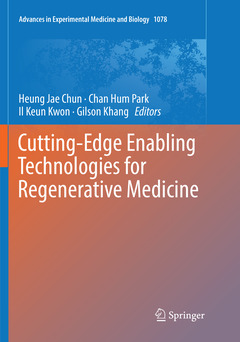Description
Cutting-Edge Enabling Technologies for Regenerative Medicine, Softcover reprint of the original 1st ed. 2018
Advances in Experimental Medicine and Biology Series, Vol. 1078
Coordinators: Chun Heung Jae, Park Chan Hum, Kwon Il Keun, Khang Gilson
Language: English
Subjects for Cutting-Edge Enabling Technologies for Regenerative Medicine:
Publication date: 01-2019
Support: Print on demand
Publication date: 11-2018
Support: Print on demand
Description
/li>Contents
/li>Biography
/li>Comment
/li>
This book explores in depth the latest enabling technologies for regenerative medicine. The opening section examines advances in 3D bioprinting and the fabrication of electrospun and electrosprayed scaffolds. The potential applications of intelligent nanocomposites are then considered, covering, for example, graphene-based nanocomposites, intrinsically conductive polymer nanocomposites, and smart diagnostic contact lens systems. The third section is devoted to various drug delivery systems and strategies for regenerative medicine. Finally, a wide range of future enabling technologies are discussed. Examples include temperature-responsive cell culture surfaces, nanopatterned scaffolds for neural tissue engineering, and process system engineering methodologies for application in tissue development. This is one of two books to be based on contributions from leading experts that were delivered at the 2018 Asia University Symposium on Biomedical Engineering in Seoul, Korea ? the companion book examines in depth novel biomaterials for regenerative medicine.




